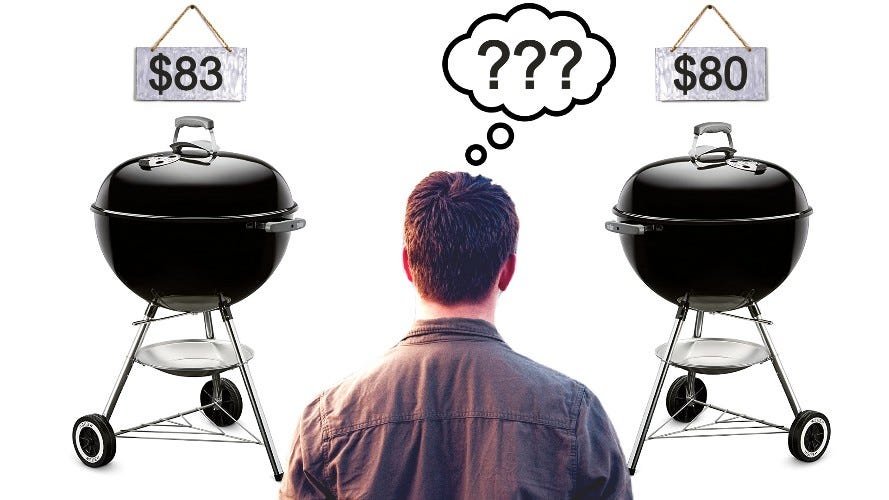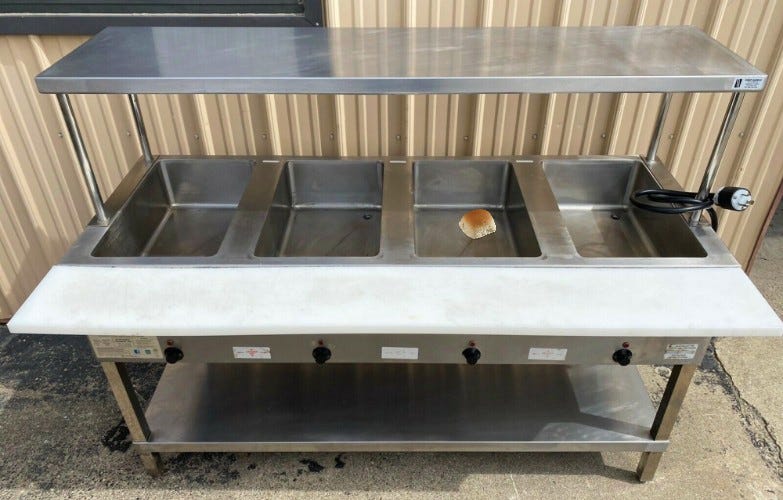The Tariff Debate is Stupid Even By Our Standards
I'm beginning to think that Donald Trump was not the brilliant tactician I thought he was

Would you rather be attacked by 83 snakes or 80 snakes? Would you rather drink 83 milliliters of pee or 80 milliliters? Would you rather watch George Clooney’s The Midnight Sky for 83 minutes or 80? These feel like easy questions to me, but Biden is struggling with a similar question when it comes to tariffs.
Biden could slightly reduce inflation by removing the tariffs Trump imposed in 2018. The effect would be small: A study by the Peterson Institute for International Economics calculated a 0.3 percent reduction in the Consumer Price Index, which means that today’s 8.3 percent inflation rate would become 8.0 (hence the numbers in the previous paragraph). A separate study estimated a one percent reduction over a longer timeframe. This is not a magic bullet that would end inflation. Of course, magic doesn’t exist, so neither do magic bullets, thus all change is incremental, and therefore to oppose something because it's “not a magic bullet” is to establish grounds for opposing the entire concept of progress.
The policy options at Biden's disposal to fight inflation are measly. Here’s a visual approximation of the buffet of non-monetary policy options that the White House can use to fight inflation:
In this analogy, Biden is starving for a dinner roll. In fact, the American people need rolls; the lack of dinner rolls is eroding real wages and making people angry. Republicans are gearing up to promise voters an avalanche of rolls and to argue that Democrats' failure to deliver rolls proves they’re unfit to govern.
Personally, I think we should eat the roll. And it drives me nuts that the main argument against1 eating the roll seems to be “it’s only one roll, though”.
This insipid debate is just the latest stupid chapter in a four-year braindead policy odyssey for morons. Let’s recall that these tariffs were Trump trade adviser Peter Navarro's brainchild, de-emphasis on the “brain”, emphasis on the “child”. Navarro is best known for being indicted for contempt of Congress, which unfortunately obscures the fact that he is quite possibly the worst economist alive. Having Peter Navarro and Donald Trump cooperate on trade policy is like having Oasis and Yoko Ono form a supergroup, except in the case of Trump and Navarro, there’s no way to avoid this collaboration of the damned.
Navarro famously misunderstands a basic macroeconomic concept about how national wealth is determined (more economists being stunned by this revelation can be found here, here, and here). GDP is calculated by this equation, which won’t be on the test so don’t worry about it too much:
GDP = Consumption + Investment + Government Spending + (Exports - Imports)
Trump and Navarro fixated on the bold part. If you import more than you export (as the US does), then the bold part of the equation will be a negative number. That will make it look like a trade deficit is reducing GDP. But that’s not how to interpret that number; as explained by the links above (I like this one best), the “imports minus exports” formulation exists for accounting purposes and tells you basically nothing about the state of the economy. Of course, if you’re a complete fucking moron — or, in the case of Trump and Navarro, two complete fucking morons2 — you’ll look at that negative number and think “if it was positive, we’d all be rich!” You will then embark on a misguided tariff regime to try to make that number positive, which — to quote one of my favorite lines from Veep — is like using a croissant as a dildo: It doesn’t do the job, and it makes a fucking mess.
Trump’s trade war has gone about as well as expected, which is to say: It’s gone very badly. It cost the US an estimated 300,000 jobs in its first year. The Brookings Institute found that manufacturing jobs in the Rust Belt were hit especially hard. Soybean farmers suffered acute pain. The tariffs failed on their own terms: Our trade deficit is larger than it was before they went into effect. In early 2020, Trump bragged that the tariffs had pressured China into signing a deal in which they agreed to buy $200 billion of US goods and services, but after signing the deal China just didn’t buy the stuff, which you have to admit is pretty baller. Basically any economist would have predicted that this is more or less how things would go, but Trump hired the one economist who seems to have gotten his PhD from the claw game at the bowling alley.
Some argue that inflation concerns are a smokescreen used by people who always opposed the tariffs. And I confess: I dislike the tariffs for reasons that have nothing to do with inflation. I do, indeed, have a bone to pick with this policy that clearly hurts more people than it helps — guilty as charged. But it's still true that scrapping the tariffs would help inflation a bit. The “you oppose the tariffs for other reasons” argument feels like a trick; this policy is bad for 50 reasons, and when I cite one of those reasons, the counterargument becomes “but you actually oppose the policy for one of the other 49 reasons.” It's a clever two-step, though I feel that the people advocating for the policy that's bad in dozens of ways should be the ones explaining themselves.
The not-completely-terrible argument for keeping the tariffs comes from U.S. Trade Representative Katherine Tai. Tai seems to be the main advocate for tariffs in the Biden administration; she reportedly wants to keep some or all of the tariffs in place to give her leverage in negotiations with China. I get that — China respects trade rules about as much as Bostonians respect traffic laws. It would be good if we could get them to comply with international norms. We really need three things: 1) A body for resolving trade disputes; 2) A pan-Asian trade pact that reduces China’s leverage; and 3) Names for these things that aren’t “The World Trade Organization” and “The Trans-Pacific Partnership” in order to obscure the fact that we already fucking did this and then walked away from our hard work for some fucking reason.
I'm skeptical that Trump's tariffs will pry anything big out of China. They've been in place for four years, and all we've gotten is a promise to buy stuff that proved to be as credible as a deadbeat dad's promise to take his kids to Disneyland. Tai wants a broad reimagining of our trade relationship with China, and I think that's the right way to go; our issues with China are varied and many and require a multifaceted agreement. But that agreement will take time to develop, and the tariffs are in effect now. Past a certain point, the damage we inflict on ourselves is greater than whatever benefit the policy can leverage, and my suspicion is that we passed that point a while ago.
I'll make another confession: One reason I like talking about trade in the context of inflation is that it reinforces the link between trade and low prices. It's trendy in lefty circles to sneer at the seemingly small consumer benefits of trade; Bernie Sanders’ stump speech included a riff about how better shampoo and deodorant don't greatly enhance our quality of life. It's a bit difficult to tell what the hell grandpa was talking about in that rant — and I feel that you can only believe that deodorant doesn't contribute to quality of life if you haven't tried Tom's of Maine — but Bernie’s message is that trade screws the working man in exchange for trivial gains. Talking about trade and inflation together pushes back against that simplistic narrative by emphasizing that when prices go up, real wages go down (and inflation and prices aren’t quite the same thing, but they’re both about purchasing power). Trade lowers prices in developed countries, lifts scores out of poverty in undeveloped ones, and grows economies in both countries. That’s the up-side; the down-side is that certain jobs in developed countries get displaced, which sucks immeasurably if you have one of those jobs. We shouldn’t ignore the down-side, but we should also give appropriate weight to the up-side instead of waving it away as frivolous consumerist penny-pinching.
Biden has ordered a “comprehensive review” of the tariffs, which is a euphemism for “I’ll do this as soon as this committee gives me political cover by finding the thing that I know they’ll find.” He’ll probably repeal some tariffs in a few months. If he does, that will represent a partial extraction of the national penis from our own zipper, and will probably reduce inflation a smidge. In terms of impact, tariff removal is far from the most important policy. But in terms of being a completely obvious thing to do, from my perspective, this requires as little brainpower as the amount of brainpower that went into the decision to begin with.
I don't want to strawman, so let me acknowledge that the other main arguments for keeping the tariffs are: 1) To give us leverage against China, and 2) To provide an incentive to manufacture products in the US. I address these arguments later in the article.
So: Here I have violated my own rule about not calling my opponents stupid. That’s not great, though this feels kind of like entrapment. I did also predict that when I violated the rule, it would be in reference to Trump. At any rate, I won’t make calling people “stupid” a habit.






Great column!
"I feel that you can only believe that deodorant doesn't contribute to quality of life if you haven't tried Tom's of Maine"
Is this because Tom's of Maine is really awesome deodorant that contributes greatly to your quality of life, or because it's lousy deodorant that makes you realize how good other brands are by comparison?